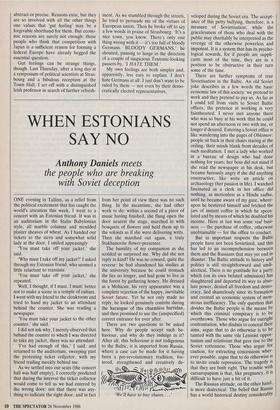WHEN ESTONIANS SAY NO
Anthony Daniels meets
the people who are breaking with Soviet deception
ONE evening in Tallinn, as a relief from the political excitement that has caught the world's attention this week, I went to a concert with an Estonian friend. It was in an auditorium in the Stalin Babylonian style, all marble columns and moulded plaster sheaves of wheat. As I handed our tickets to the stem and somewhat solid lady at the door, I smiled appeasingly. 'You must take off your jacket,' she said.
`Why must I take off my jacket?' I asked through my Estonian friend, who seemed a little reluctant to translate.
`You must take off your jacket,' she repeated. Well, I thought, if I must, I must: better not to make a scene in a temple of culture. I went with my friend to the cloakroom and tried to hand my jacket to an attendant behind the counter. She was reading a newspaper. 'You must take your jacket to the other counter,' she said.
I did not ask why, I merely observed that behind the counter to which I was directed to take my jacket, there was no attendant. `I've had enough of this,' I said, and returned to the auditorium, sweeping past the protesting ticket collector, with my friend trailing meekly behind me.
As we settled into our seats (the concert hall was half empty), I correctly predicted that during the interval the ticket collector would come to tell us we had entered by the wrong door: not that there was any- thing to indicate the right door, and in fact from her point of view there was no such thing. In the meantime, she had other work to do: within a second of a piece of music having finished, she flung open the door nearest the stage, marched in with bouquets of flowers and held them up to the soloists as if she were delivering writs. Then she marched out again, a truly Stakhanovite flower-presenter. The humility of my companion as she scolded us surprised me. Why did she not reply in kind? He was no coward, quite the reverse: he had abandoned his studies at the university because he could stomach the lies no longer, and had gone to live in the forest by gathering honey. He dressed as a Mohican; his very appearance was a complete rejection of the happy, inevitable Soviet future. Yet he not only made no reply, he looked genuinely contrite during the harangue of this charmless harridan, and then promised to use the (unspecified) correct entrance for ever after.
There are two questions to be asked here. Why do people accept such be- haviour, and why do they indulge in it? After all, this behaviour is not indigenous to the Baltic, it is imported from Russia, where a case can be made for it having been a pre-revolutionary tradition, fos- tered, strengthened and creatively de- 'We'll have to buy shares.. ..' veloped during the Soviet era. The accept- ance of this petty bullying, therefore, is a measure of Sovietisation; while the gracelessness of those who deal with the public may charitably be interpreted as the revenge of the otherwise powerless and impotent. It is a system that has its psycho- logical rewards, for if people are suppli- cants most of the time, they are in a position to be obstructive in their turn some of the time.
There are further symptoms of true Sovietisation in the Baltic. An old Soviet joke describes in a few words the basic economic law of this society: we pretend to work and they pretend to pay us. As far as I could tell from visits to Soviet Baltic offices, the pretence at working is very fainthearted. I never met anyone there who was so busy at his work that he could not spend an afternoon or two with me, or longer if desired. Entering a Soviet office is like wandering into the pages of Oblomov: people sit back in their chairs staring at the ceiling, their minds blank from decades of such meditation. I met a lady who worked in a' bureau of design who had done nothing for years; her boss did not mind if she read the newspaper at his desk, but became furiously angry if she did anything constructive, like write an article on archaeology (her passion in life). I watched fascinated as a clerk in her office did nothing, as motionless as a Hindu sadhu, until he became aware of my gaze, where- upon he bestirred himself and fetched the jars of instant coffee in which he specu- lated and by means of which he doubled his income. Here at last was some real busi- ness — the purchase of coffee, otherwise unobtainable — for the office to conduct.
But in important respects the Baltic people have not been Sovietised, and this has led to an incomprehension between them and the Russians that may yet end in disaster. The Baltic attitude to history and politics is still straightforward and undi- alectical. There is no gratitude for a party which (on its own belated admission) has slaughtered and deported its way to abso- lute power, denied all freedom and demo- cracy, lied shamelessly since its formation and created an economic system of mon- strous inefficiency. The only question that divides the Baltic people is the means by which this criminal conspiracy is to be overthrown. Those who argue for outright confrontation, who disdain to conceal their aims, argue that to do otherwise is to be tainted with the same vile Leninist oppor- tunism and relativism that gave rise to the Soviet rottenness. Those who argue for caution, for extracting concessions wher- ever possible, argue that to do otherwise is to invite crude repression. The tragedy Is that they are both right. The trouble with caesaropapism is that, like pregnancy, it is difficult to have just a bit of it. The Russian attitude, on the other hand, is more dialectical. The belief that Russia has a world historical destiny considerably predates the revolution and is quite patible with Marxist messianism: taken together, they are a potent emotional cocktail. That is why the revelation of mere empirical facts about the past, which has been as cruel to Russia as to the Baltic, does not have the impact on the Russian mind that one might have expected. When a Russian journalist asked me what I thought of the goings-on in the Baltic, I replied that it was remarkable to hear it admitted in public that all that for half a century had been reviled as anti-Soviet propaganda was — every last word of it perfectly true. He was horrified, but not by the thought that since the dawn of his consciousness he had accepted and filled his mind with deceptions, whose dissemi- nation had until recently been his chosen profession, but that I should express myself so forcibly and refuse to utter the expected anodyne remarks about peace and friendship. As for the complaints of the Latvians, Lithuanians and Estonians, it was not that he denied their basis in fact, it was that he denied their moral significance. The deportations, executions, shortages, were accommodated in his mind as blips on the glorious upward curve of history . .
But for the Baltic people lies are still lies: the Leninist epistemology, in which untruths — if they are useful — are truer than truth itself, has not eaten into their soul. This has certain psychological dis- advantages, however. Since until recently they were forced to regurgitate what they knew to be false, and suppress any sign of knowing the truth, they lacked self-esteem and felt like accomplices in something dirty. 'Our slavery,' said an engineer, 'is within us.' No one believes in the work he does and this, too, destroys self-esteem. Always to speak the truth in whispers, behind locked doors, while assenting to lies In public and performing duties that are worse than meaningless is profoundly corrosive of character. The only way to escape this corrosion is to pass through what several people called the fear barrier, for .it is fear that maintains the whole edifice. And to meet such people — a historian who is now a night watchman, an unemployed concert pianist who has never been allowed to perform in public, a biologist who translated Darwin into Esto- man in the camps but had never had it published, a Catholic dissident in Lithuania who prays that the Holy Spirit may infuse the KGB when its goons continue to wake her with obscene noctur- nal telephone calls — is deeply moving, for these are people enclosed in a nutshell yet kings of infinite space.
In the Soviet Union', said an Estonian, we do not have life. We have anecdotes.' But things are changing and people ordinary people — are learning to be free again. I think the Russians are looking on closely, alarmed and uncomprehending, uncertain what to do. Fear may have to be reimposed. Yet time and again in the Baltic I recalled a letter that one of the greatest writers of Russia's incomparable literature sent to his friend and publisher, A. S. Suvorin. On 7 January 1889, Chekh- ov wrote:
Tell the story of how a young man, the son of a serf, who has served in a shop, sung in a choir, been at a high school and a university, who has been brought up to respect everyone of higher rank and position, to kiss priests' hands, to reverence other people's ideas, to be thankful for every morsel of bread, who has been many times whipped . . who has been used to fighting and tormenting anim- als, who has liked dining with his rich relations, and been hypocritical before God and men from the mere consciousness of his own insignificance — write how this young man squeezes the slave out of himself, drop by drop, and how waking one fine morning feels that the blood coursing through his veins is no longer that of a slave but that of a real human being .











































































 Previous page
Previous page